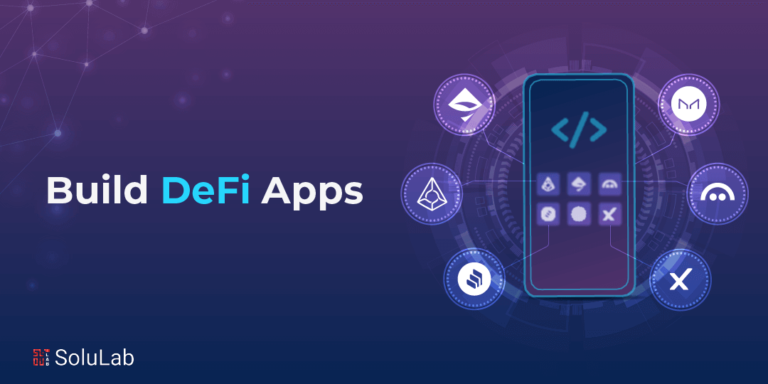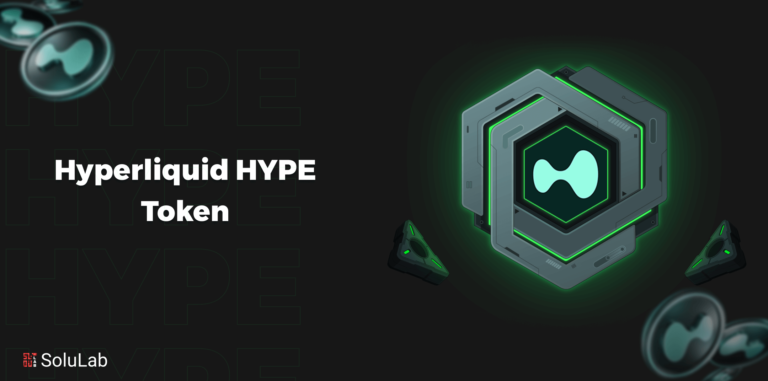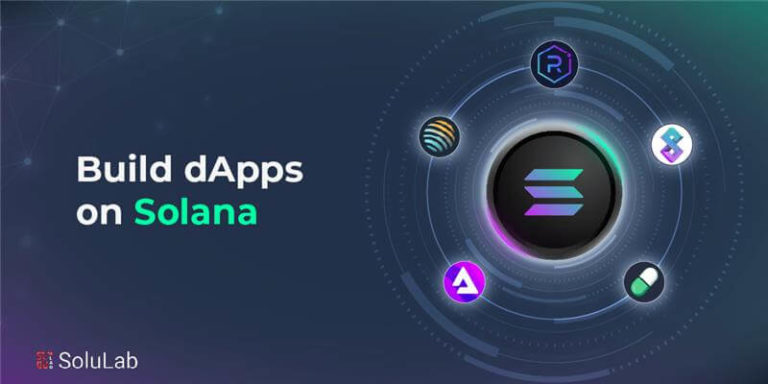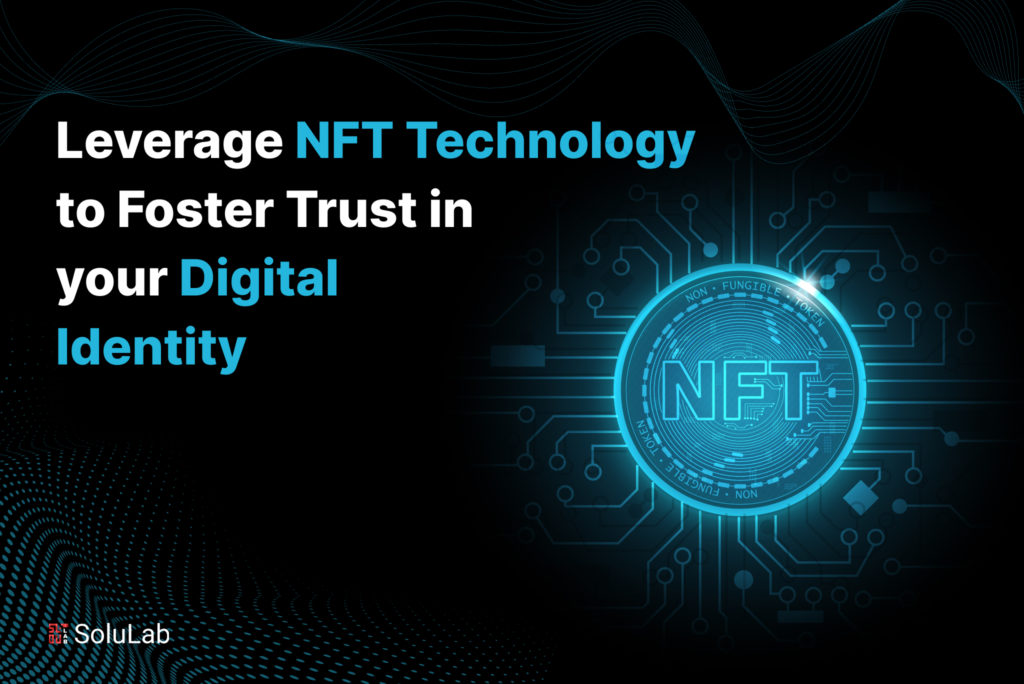
In an increasingly digital world, where our online presence and interactions hold significant importance, the concept of digital identity has become more crucial than ever. Digital identity refers to the unique set of attributes, characteristics, and credentials that define an individual or entity in the online realm. However, the traditional methods of managing digital identities have faced challenges such as security breaches, data theft, and privacy concerns. In this era of rapid technological advancement, Non-Fungible Tokens (NFTs) have emerged as a groundbreaking solution to revolutionize the way we perceive and secure digital identities.
This article explores the intersection of NFT technology and digital identity, highlighting how NFTs can be harnessed to enhance trust and security in the digital realm. We will delve into the concept of NFT-based digital identities, discuss emerging trends, showcase notable NFT development companies, and explore potential solutions and services in the domain of NFT development for digital identity.
Before we dive into the implications of NFTs for digital identity, let’s begin with a basic understanding of what NFTs are and why they have gained such immense popularity.
What Are Non-Fungible Tokens (NFTs)?
Non-fungible tokens, commonly known as NFTs, are digital assets that represent ownership or proof of authenticity of a unique item or piece of content, often linked to a digital or physical entity. NFTs are non-fungible, which means each token is unique and cannot be exchanged for another on a like-for-like basis, in contrast to cryptocurrencies like Bitcoin or Ethereum which are fungible and can be transferred on a one-to-one basis. This uniqueness and indivisibility make NFTs ideal for representing digital identities.
NFTs are built on blockchain technology, which provides the immutable and transparent ledger necessary to ensure the authenticity and ownership of these digital assets. Ethereum is the most widely used blockchain platform for NFTs, but other platforms like Binance Smart Chain and Flow are gaining prominence in the NFT space.
The NFT Boom
The NFT craze began gaining mainstream attention in 2021, with artists, musicians, athletes, and collectors flocking to the space to create, sell, and buy digital assets represented as NFTs. High-profile NFT sales, such as Beeple’s artwork selling for $69 million and NBA Top Shot moments fetching substantial sums, demonstrated the enormous potential of NFTs.
Read Blog Post: Top 25 NFT Startups to Watch out in 2024
While NFTs initially found their footing in the world of art and entertainment, they have since transcended these boundaries and are being applied to a wide range of use cases, including digital identity.
NFTs and Digital Identity: A Perfect Match
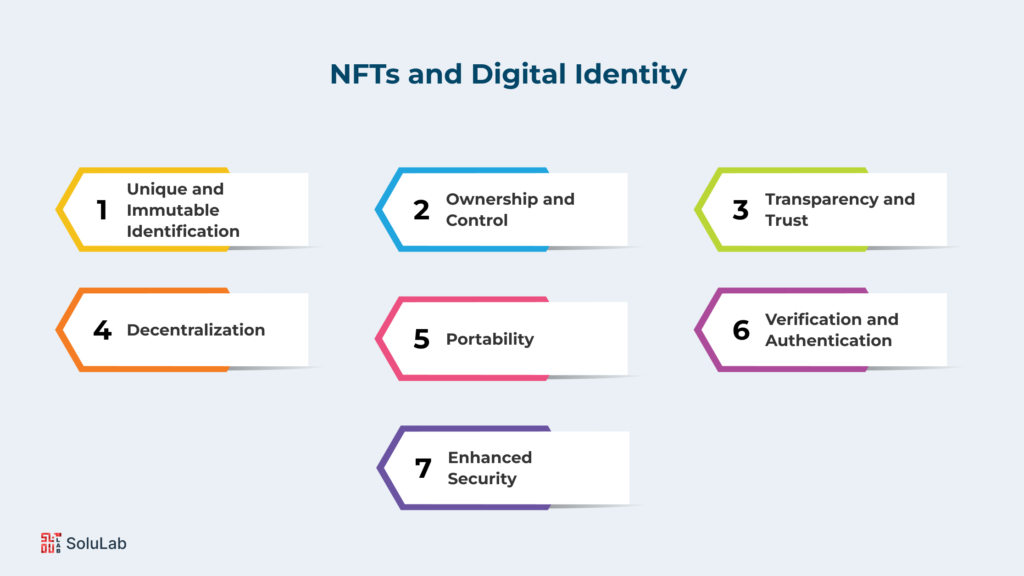
The fusion of NFTs and digital identity brings forth a myriad of opportunities to address the challenges associated with online identification and authentication. Here’s how NFTs can be leveraged to foster trust in your digital identity.
1. Unique and Immutable Identification
NFTs excel at representing unique assets, and this quality can be directly applied to digital identity. When an individual or entity’s identity is represented by an NFT, it becomes a one-of-a-kind, tamper-proof representation that cannot be duplicated or forged. This uniqueness and immutability enhance the security and trustworthiness of the digital identity.
Related: Unlocking the Future: NFT Marketplace Development and Blockchain Technology Insights
2. Ownership and Control
One of the key issues with traditional digital identities is the lack of control individuals have over their own data. NFTs can change this paradigm by allowing users to own and control their digital identities. Users can decide what information is associated with their NFT identity and grant or revoke access to it as needed. This shift in control empowers individuals to protect their data and privacy.
3. Transparency and Trust
The blockchain technology underlying NFTs ensures transparency and trust in the system. Every transaction, update, or interaction with an NFT-based digital identity is recorded on the blockchain, creating an auditable trail of activities. This transparency builds trust among users and entities relying on these digital identities.
4. Decentralization
NFT-based digital identities can be stored and managed in a decentralized manner, reducing the reliance on centralized authorities and single points of failure. Decentralized identity systems powered by NFTs distribute identity data across a network of nodes, making it more resilient to attacks and data breaches.
Related: Building Trust and Transparency in Your NFT Marketplace Ecosystem
5. Portability
NFT-based digital identities are highly portable. Users can carry their digital identity with them across different platforms and services, eliminating the need to create and manage separate identities for various online interactions. This convenience simplifies the user experience while maintaining security.
6. Verification and Authentication
Entities and services can easily verify and authenticate NFT-based digital identities by checking the blockchain for the associated NFTs. This streamlined process enhances security while reducing the risk of fraudulent activities and identity theft.
7. Enhanced Security
NFTs inherit the robust security features of blockchain technology, including cryptographic encryption and decentralization. This makes NFT-based digital identities inherently more secure compared to traditional username-password combinations or even biometric authentication methods.
Emerging Trends in NFT-Based Digital Identity
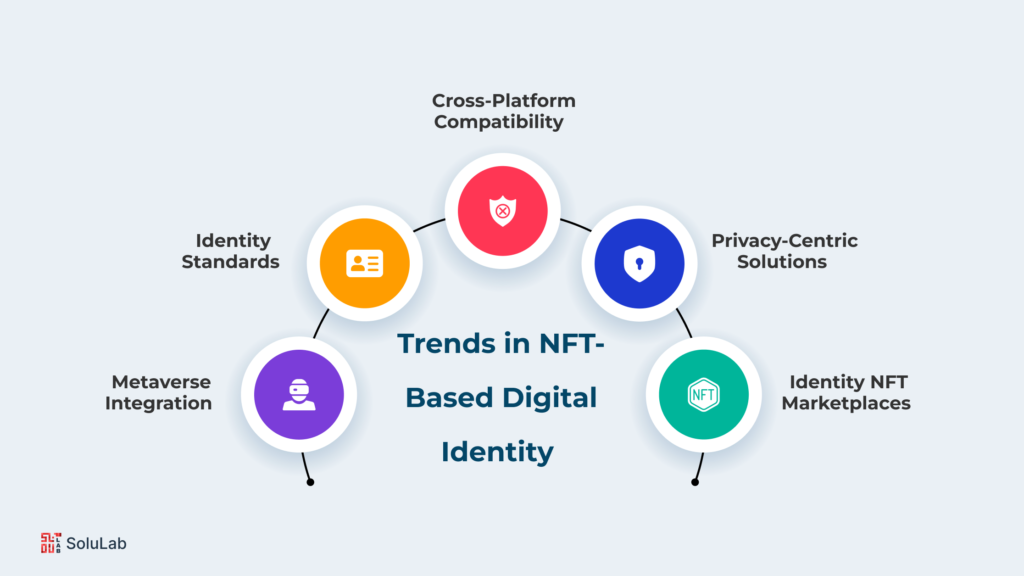
As the adoption of NFTs for digital identity gains momentum, several trends are emerging that indicate the direction this technology is heading.
1. Metaverse Integration
The concept of the metaverse, a virtual shared space where users interact with each other and digital objects, is closely tied to NFTs and digital identity. NFT-based digital identities are poised to play a pivotal role in the metaverse, allowing users to seamlessly transition between virtual and real-world identities.
2. Identity Standards
Standardization of NFT-based digital identity protocols is essential to ensure interoperability across different platforms and services. Organizations like the Decentralized Identity Foundation (DIF) are actively working on defining these standards to facilitate widespread adoption.
Related: How To Launch Your Own NFT Marketplace Website in Less Than 2 Days?
3. Cross-Platform Compatibility
To realize the full potential of NFT-based digital identities, they must be compatible with a wide range of applications, services, and ecosystems. Developers are working on solutions that enable NFT identities to function seamlessly across diverse digital landscapes.
4. Privacy-Centric Solutions
Privacy remains a significant concern in the digital identity space. Emerging trends include the development of privacy-centric NFT-based identity solutions that give users granular control over what information is shared and with whom.
5. Identity NFT Marketplaces
Dedicated marketplaces for trading, buying, and selling identity NFTs are emerging. These marketplaces provide a platform for individuals and organizations to manage their digital identities and access related services.
NFT Development Solutions for Digital Identity
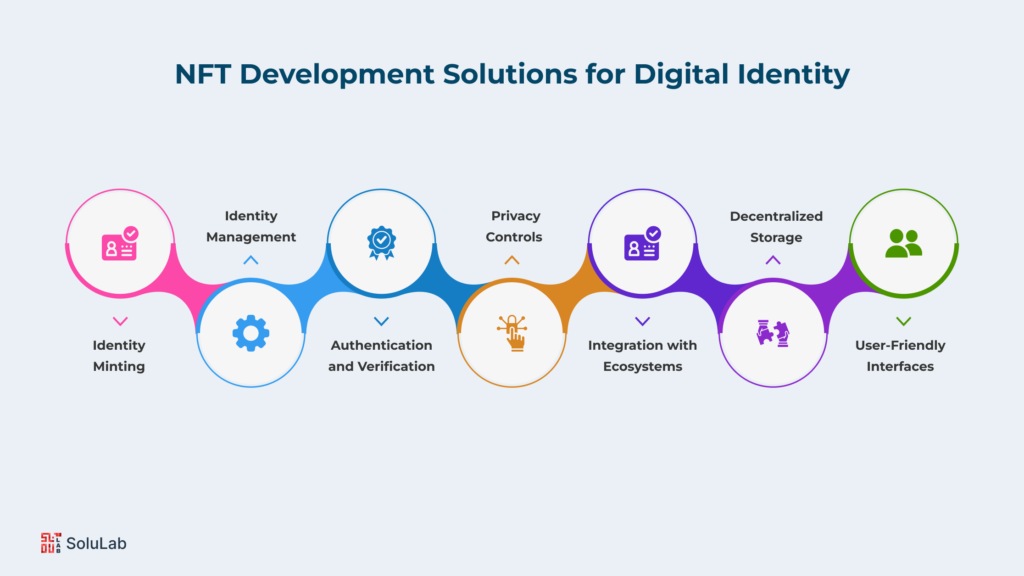
Implementing NFT-based digital identity solutions requires a comprehensive approach that encompasses several key components. Let’s explore some of the essential NFT development solutions for digital identity.
1. Identity Minting
Identity minting refers to the process of creating identity NFTs. NFT development companies offer user-friendly interfaces and tools that allow individuals and organizations to mint their unique digital identities on the blockchain. These identity NFTs serve as the foundation for the entire digital identity ecosystem.
2. Identity Management
Once identity NFTs are created, they need to be effectively managed. Identity management solutions provided by NFT development companies enable users to update, modify, and customize their digital identities as needed. This includes adding or removing attributes, verifying information, and setting access controls.
3. Authentication and Verification
Authentication and verification solutions are essential to establish trust in digital identities. NFT-based digital identities can be authenticated by verifying the associated NFTs on the blockchain. NFT development companies often provide tools and APIs for easy integration into existing authentication systems.
4. Privacy Controls
Privacy is a paramount concern in the digital identity space. NFT development solutions for digital identity often include privacy controls that allow users to determine what information is shared and with whom. These controls empower individuals to safeguard their personal data.
5. Integration with Ecosystems
For NFT-based digital identities to be effective, they must seamlessly integrate with a wide range of applications and services. NFT development companies offer integration solutions that enable developers to incorporate NFT identities into their platforms, whether it be social media, financial services, or metaverse environments.
6. Decentralized Storage
To enhance security and reduce reliance on centralized entities, NFT development solutions often incorporate decentralized storage options. Identity data can be stored across a distributed network of nodes, ensuring redundancy and resilience.
7. User-Friendly Interfaces
User experience is a critical factor in the adoption of NFT-based digital identities. NFT development companies prioritize creating intuitive and user-friendly interfaces that make it easy for individuals to manage and interact with their digital identities.
NFT Development Services for Digital Identity
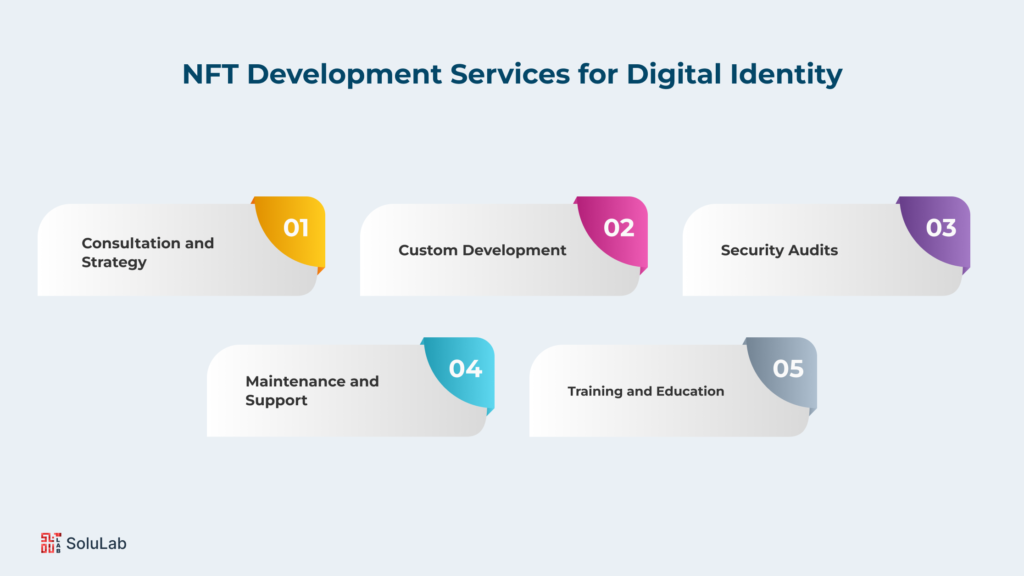
In addition to development solutions, NFT development companies offer a range of services to support the implementation and maintenance of NFT-based digital identities. These services play a pivotal role in ensuring the success and sustainability of digital identity projects.
1. Consultation and Strategy
NFT development companies often provide consultation and strategy services to help organizations define their digital identity goals, assess their specific needs, and develop a roadmap for implementation. These services are crucial for aligning digital identity initiatives with broader business objectives.
2. Custom Development
Not all digital identity projects are the same, and customization may be required to meet unique requirements. NFT development companies offer custom development services to tailor NFT identity solutions to the specific needs of their clients.
Read Also: The Future of NFT Marketplaces: Trends and Innovations
3. Security Audits
Security is paramount in digital identity projects. NFT development companies offer security audit services to assess the robustness of NFT-based identity systems, identify vulnerabilities, and implement necessary safeguards.
4. Maintenance and Support
Digital identity systems require ongoing maintenance and support to ensure they remain secure and up to date. NFT development companies provide maintenance and support services to address issues, apply updates, and provide assistance as needed.
5. Training and Education
Educating users and stakeholders is a crucial aspect of successful digital identity adoption. NFT development companies offer training and education services to help individuals and organizations understand how to use and manage their NFT-based digital identities effectively.
Conclusion
The convergence of NFT technology and digital identity holds immense promise for transforming how we manage and secure our online personas. NFTs offer unique and immutable identification, ownership and control, transparency and trust, decentralization, portability, verification, and enhanced security, making them a natural fit for digital identity solutions.
As emerging trends in the NFT-based digital identity space continue to evolve, the role of NFTs in shaping the future of online identification is becoming increasingly evident. Notable NFT development companies are actively driving innovation in this field, offering comprehensive solutions and services to support the development and deployment of NFT-based digital identities.
In this digital age, where trust and security are paramount, leveraging NFT technology to foster trust in your digital identity is not just a trend; it’s a transformative leap towards a more secure and user-centric online world. With the right NFT development solutions and services, individuals and organizations can seize the opportunity to redefine and enhance their digital identities in a way that truly empowers and protects them.
A reputable NFT development company with years of experience creating blockchain-based solutions is SoluLab. We have a group of skilled NFT developers who can create distinctive NFTs that are cost-efficient, scalable, and secure.
The considerable experience in NFT development, various engagement choices, cost-effective solutions, and focus on clear communication make SoluLab’s top NFT developers stand out. SoluLab keeps you informed on the status of your project on a regular basis through progress reports, and the design and development expertise of our staff assures high-quality NFTs that are catered to your particular requirements. For further assistance, contact SoluLab today.
FAQs
1. What is a Non-Fungible Token (NFT)?
A Non-Fungible Token (NFT) is a digital asset that represents ownership or proof of authenticity of a unique item or piece of content. Unlike cryptocurrencies such as Bitcoin, NFTs are non-fungible, meaning each token is distinct and cannot be exchanged on a like-for-like basis.
2. How does an NFT work?
NFTs are peculiarly made based on blockchain technology, such as Ethereum. Each NFT has a unique digital signature, which verifies its authenticity and ownership. This signature is recorded on the blockchain, creating a secure and transparent ledger.
3. What can NFTs be used for?
NFTs have a wide range of use cases, including digital art, collectibles, music, virtual real estate, in-game items, and even digital identity management. They represent ownership and uniqueness in the digital world.
4. How can NFTs enhance digital identity?
NFTs can enhance digital identity by providing a unique and immutable representation of an individual or entity in the online realm. They offer ownership and control over digital identity, increased security, transparency, and decentralized management.
5. Are NFTs secure?
NFTs inherit the security features of blockchain technology, making them highly secure. They rely on cryptographic encryption, decentralized storage, and transparency to protect the integrity and ownership of digital assets.
6. Can NFTs be traded or sold?
Yes, NFTs can be traded or sold on NFT marketplaces. Owners can choose to sell or transfer their NFTs to other individuals or collectors, often for varying amounts depending on the item’s rarity and demand.
7. Are there any standards for NFT-based digital identities?
Yes, standards for NFT-based digital identities are emerging. Organizations like the Decentralized Identity Foundation (DIF) are actively working on defining these standards to ensure interoperability and consistency across different platforms.
8. How can I get started with NFT-based digital identity?
To get started with NFT-based digital identity, you can explore NFT development companies that offer solutions and services for identity minting, management, authentication, and more. Consider consulting with experts in the field to align your goals with the right strategy and implementation plan.




